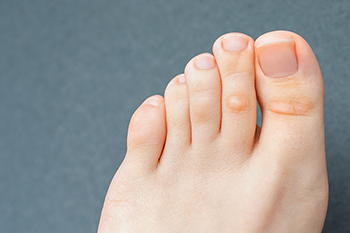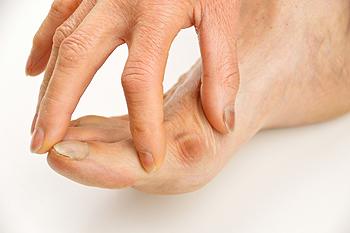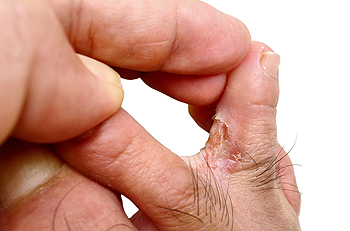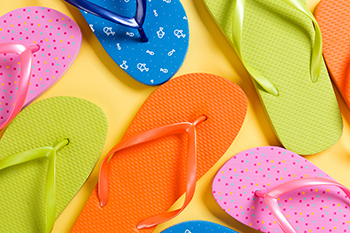Connect With Us
Blog
Items filtered by date: July 2022
What to Do About Foot Corns

A foot corn is a thick, hardened area of skin on the foot that usually comes as a result of friction on the feet from shoes. They are the body’s way of protecting the skin underneath. There are a number of methods used to treat corns—from home products for softening the corn like castor oil or pumice stones to surgery. Ways to prevent corns include keeping feet clean, dry, and moisturized. Other methods include wearing comfortable, well-fitting shoes that do not pinch the foot, using corn pads to cover the corn while it is healing, and trimming toenails regularly so pressure that leads to corns does not develop. Usually corns are not serious, however there are times when they can become painful and in need of professional examination by a podiatrist. It is especially important for those with diabetes to consult with a podiatrist at their earliest convenience as they can suffer from numbness and neuropathy. This makes it hard for them to detect a developing infection of the foot.
If you have any concerns regarding your feet and ankles, contact one of our podiatrists of Omega Podiatry. Our doctors will treat your foot and ankle needs.
Corns: What Are They? and How Do You Get Rid of Them?
Corns can be described as areas of the skin that have thickened to the point of becoming painful or irritating. They are often layers and layers of the skin that have become dry and rough, and are normally smaller than calluses.
Ways to Prevent Corns
There are many ways to get rid of painful corns such as wearing:
- Well-fitting socks
- Comfortable shoes that are not tight around your foot
- Shoes that offer support
Treating Corns
Treatment of corns involves removing the dead skin that has built up in the specific area of the foot. Consult with Our doctors to determine the best treatment option for your case of corns.
If you have any questions please feel free to contact our offices located in Los Angeles, Huntington Park, and Reseda, CA . We offer the newest diagnostic and treatment technologies for all your foot and ankle needs.
Why Live with Pain and Numbness in Your Feet?
What Is a Bunion?
 A bunion, or hallux valgus, is a bony bump on the side and base of the big toe. These develop from pressure put on the big toe joint and causes the toe to move out of place and lean inward toward the second toe. Because the big toe carries a lot of weight in standing, walking, and all activities we do, a bunion can cause pain, stiffness, redness, and swelling. Calluses can also form where the big and second toe rub against each other or on the ball of the foot. Untreated, bunions can become worse, and it may be difficult to wear regular shoes or walk comfortably. They can occur on one or both feet. It is rare but possible that children are born with bunions (known as congenital hallux valgus) or develop them later in childhood (juvenile or adolescent hallux valgus). Most often bunions occur in adulthood. They are more common in women, perhaps because of their unique foot anatomy, footwear choices or genetics. Wearing shoes that are too tight, have high heels, or insufficient room in the toe box, and those with some medical conditions (like rheumatoid arthritis) are more prone to developing bunions as well. If you have a bunion that has become uncomfortable, consult with a podiatrist who can provide remedies to restore you to better functioning.
A bunion, or hallux valgus, is a bony bump on the side and base of the big toe. These develop from pressure put on the big toe joint and causes the toe to move out of place and lean inward toward the second toe. Because the big toe carries a lot of weight in standing, walking, and all activities we do, a bunion can cause pain, stiffness, redness, and swelling. Calluses can also form where the big and second toe rub against each other or on the ball of the foot. Untreated, bunions can become worse, and it may be difficult to wear regular shoes or walk comfortably. They can occur on one or both feet. It is rare but possible that children are born with bunions (known as congenital hallux valgus) or develop them later in childhood (juvenile or adolescent hallux valgus). Most often bunions occur in adulthood. They are more common in women, perhaps because of their unique foot anatomy, footwear choices or genetics. Wearing shoes that are too tight, have high heels, or insufficient room in the toe box, and those with some medical conditions (like rheumatoid arthritis) are more prone to developing bunions as well. If you have a bunion that has become uncomfortable, consult with a podiatrist who can provide remedies to restore you to better functioning.
If you are suffering from bunion pain, contact one of our podiatrists of Omega Podiatry. Our doctors can provide the care you need to keep you pain-free and on your feet.
What Is a Bunion?
Bunions are painful bony bumps that usually develop on the inside of the foot at the joint of the big toe. As the deformity increases over time, it may become painful to walk and wear shoes. Women are more likely to exacerbate existing bunions since they often wear tight, narrow shoes that shift their toes together. Bunion pain can be relieved by wearing wider shoes with enough room for the toes.
Causes
- Genetics – some people inherit feet that are more prone to bunion development
- Inflammatory Conditions - rheumatoid arthritis and polio may cause bunion development
Symptoms
- Redness and inflammation
- Pain and tenderness
- Callus or corns on the bump
- Restricted motion in the big toe
In order to diagnose your bunion, your podiatrist may ask about your medical history, symptoms, and general health. Your doctor might also order an x-ray to take a closer look at your feet. Nonsurgical treatment options include orthotics, padding, icing, changes in footwear, and medication. If nonsurgical treatments don’t alleviate your bunion pain, surgery may be necessary.
If you have any questions, please feel free to contact our offices located in Los Angeles, Huntington Park, and Reseda, CA . We offer the newest diagnostic and treatment technologies for all your foot care needs.
Steps You Can Take to Prevent Athlete’s Foot

Your feet are a critical component of your overall physical health, and keeping them healthy requires taking deliberate steps to prevent common foot afflictions. One such affliction that can pose a significant threat to the health of your feet is athlete’s foot. This fungal infection usually affects the skin in between the toes and on the bottoms of the feet, resulting in flaking and itching sensations. This troublesome condition is typically acquired when someone walks barefoot on wet surfaces used by other people in locker rooms, gyms, and public pools. There are a number of steps you can take to decrease your chances of developing athlete’s foot. First and foremost, you can consider wearing flip-flops or shower shoes whenever using public showers or walking on moist, public surfaces. Additionally, since athlete’s foot thrives in wet environments, you might change your socks and alternate shoes everyday to ensure that your socks and shoes are completely dry and free of any harmful bacteria. Lastly, you could consider washing your feet everyday with soap and drying them completely with a towel to keep them clean and dry. Making an appointment with a podiatrist might help you learn of other ways to prevent athlete’s foot.
Athlete’s foot is an inconvenient condition that can be easily reduced with the proper treatment. If you have any concerns about your feet and ankles, contact one of our podiatrists from Omega Podiatry. Our doctors will treat your foot and ankle needs.
Athlete’s Foot: The Sole Story
Athlete's foot, also known as tinea pedis, can be an extremely contagious foot infection. It is commonly contracted in public changing areas and bathrooms, dormitory style living quarters, around locker rooms and public swimming pools, or anywhere your feet often come into contact with other people.
Solutions to Combat Athlete’s Foot
- Hydrate your feet by using lotion
- Exfoliate
- Buff off nails
- Use of anti-fungal products
- Examine your feet and visit your doctor if any suspicious blisters or cuts develop
Athlete’s foot can cause many irritating symptoms such as dry and flaking skin, itching, and redness. Some more severe symptoms can include bleeding and cracked skin, intense itching and burning, and even pain when walking. In the worst cases, Athlete’s foot can cause blistering as well. Speak to your podiatrist for a better understanding of the different causes of Athlete’s foot, as well as help in determining which treatment options are best for you.
If you have any questions please feel free to contact our offices located in Los Angeles, Huntington Park, and Reseda, CA . We offer the newest diagnostic and treatment technologies for all your foot and ankle needs.
Flip Flops Can Be Fashionable but Harmful
As th e weather gets warmer and the summer season reaches its full stride, many individuals will slip on a pair of casual and seasonable flip-flops. Although flip-flops may seem like the perfect fashion statement for beach days and fun summer outings, wearing this kind of shoe for prolonged periods can yield detrimental consequences. Since one must constantly clench or tighten the toes to keep flip-flops from sliding off of the feet, wearing these shoes can negatively impact muscles in the feet and calves. Such muscular problems might even result in plantar fasciitis, causing pointed pains in the heels during physical activity such as running. Flip-flop use can create serious problems in other areas of the body including the knees. Experts recommend that flip-flops be worn for walking no more than relatively short distances. If one needs to walk more than this distance, a sandal with straps around the entire foot might prove to be a better option. Such sandals do not make the toes tighten to keep the shoe on the foot in the same way that flip-flops do. Regardless of the summer shoe you prefer, you might consider consulting with your podiatrist to ensure that your footwear choices are setting your feet up for success.
e weather gets warmer and the summer season reaches its full stride, many individuals will slip on a pair of casual and seasonable flip-flops. Although flip-flops may seem like the perfect fashion statement for beach days and fun summer outings, wearing this kind of shoe for prolonged periods can yield detrimental consequences. Since one must constantly clench or tighten the toes to keep flip-flops from sliding off of the feet, wearing these shoes can negatively impact muscles in the feet and calves. Such muscular problems might even result in plantar fasciitis, causing pointed pains in the heels during physical activity such as running. Flip-flop use can create serious problems in other areas of the body including the knees. Experts recommend that flip-flops be worn for walking no more than relatively short distances. If one needs to walk more than this distance, a sandal with straps around the entire foot might prove to be a better option. Such sandals do not make the toes tighten to keep the shoe on the foot in the same way that flip-flops do. Regardless of the summer shoe you prefer, you might consider consulting with your podiatrist to ensure that your footwear choices are setting your feet up for success.
Flip-flops are not always the best choice of footwear. If you have any concerns about your feet or ankles, contact one of our podiatrists from Omega Podiatry. Our doctors will assist you with all of your foot and ankle needs.
Flip-Flops and Feet
When the weather starts warming up, people enjoy wearing flip-flops. Flip-flops are comfortable, stylish, and easy to slip on and off; they're perfect for any summer beach goer. However, these shoes can cause harm to the feet.
How Can Flip-Flops Affect Me Long-Term?
- Ankle problems
- Hip problems
- Lower back problems
- Pain in the balls of the feet
- Problems with foot arches
- Changes in the way you walk
Are There Injuries Associated with Flip-Flops?
Yes. Since flip-flops are relatively weak and do not provide the same amount of support as sneakers, people who wear flip-flops regularly are more susceptible to injuries. On top of that, the open nature of the shoe makes your feet more prone to other problems, such as cuts and even infections. Common injuries and ailments include:
- Sprained ankles
- Blisters
- Infections
- Cuts and Scrapes
I like Wearing Flip-Flops. Are There Safe Alternatives?
When buying flip-flops, try to find ones that have sturdy soles and that are made of high-quality materials that will support for your feet. These flip-flops will cost more but will also last longer as a result.
If you have any questions please feel free to contact our offices located in Los Angeles, Huntington Park, and Reseda, CA . We offer the newest diagnostic and treatment technologies for all your foot and ankle needs.
Blog Archives
- April 2024
- March 2024
- February 2024
- January 2024
- December 2023
- November 2023
- October 2023
- September 2023
- August 2023
- July 2023
- June 2023
- May 2023
- April 2023
- March 2023
- February 2023
- January 2023
- December 2022
- November 2022
- October 2022
- September 2022
- August 2022
- July 2022
- June 2022
- May 2022
- April 2022
- March 2022
- February 2022
- January 2022
- December 2021
- November 2021
- October 2021
- September 2021
- August 2021
- July 2021
- June 2021
- May 2021
- April 2021
- March 2021

